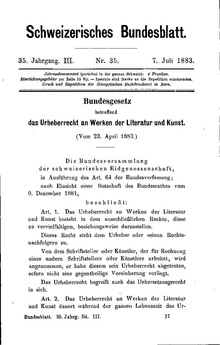Federal law (Switzerland)
In Switzerland, federal laws are legislative provisions that have been passed by the Federal Assembly and are subject to an optional referendum .
description
As quite putting it provisions that impose obligations directly binding and general abstract way confer rights or define responsibilities (art. 22, para. 4 Act of Parliament ). The Federal Constitution (BV) provides that all important legislative provisions are to be enacted at federal level in the form of federal law (Art. 164 BV). Federal laws represent laws in the formal sense .
In the event of temporal and material urgency, the Federal Assembly can declare federal laws urgent and put them into effect immediately (right of urgency ). This requires the approval of the majority of the members of both councils - the National Council and the Council of States . These urgent federal laws are to be limited in time (Art. 165 BV ).
Federal laws are to be applied by the law enforcement authorities, in particular the Federal Supreme Court , regardless of their constitutionality (Art. 190 BV). Switzerland therefore has only limited constitutional jurisdiction . As federal law, federal laws take precedence over cantonal law, which is contrary to cantonal law (Art. 49 (1) BV).
The federal laws are published in the Official Collection (AS) and in the Systematic Collection (SR).
